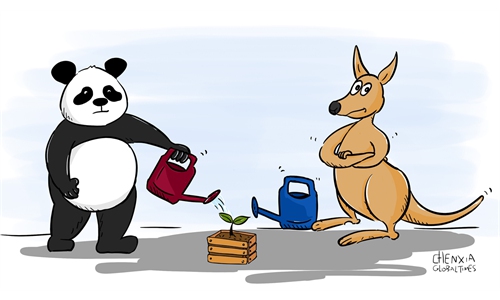Morrison govt follows Washington’s McCarthyist crackdown on China

Illustration: Liu Rui/GT
Canberra's latest proposal of the Foreign Relations Bill is not, as it claims, merely legislation to reinstate the federal-level sovereignty in foreign affairs and national security. It has been widely interpreted as with the manifest objective to veto the cooperation under the Belt and Road framework agreed between the State of Victoria and China. In conjunction with Washington's increasingly aggressive anti-China hysteria, the proposed bill asserts to put any existing and future agreement of international partnership at city council and university levels under the scrutiny of the Department of Foreign Affairs and Trade and Australia's security agencies, with their China links in the crosshairs.
When China-Australia bilateral relations are at the historically lowest ebb, the Morrison administration has recently been repeatedly provoking further tensions. China Mengniu's A$600 million bid of acquisition of Lion Diary & Drinks, which is already Japanese-owned, was barred by Australia's Treasurer Josh Frydenberg on the grounds that the "foreign investment" would be "contrary to [Australia's] national interest." We frustratingly don't have any idea about the difference between China and Japan when it comes to Canberra's definition of the word "foreign." Over the past several years, we have been exasperatingly witnessing many of such deplorable instances in which Canberra repeatedly relapses to the Cold War mentality that politicizes and weaponizes normal economic activities based on ideological grounds.
China's constructive collaboration with the state of Victoria within the BRI framework is not at all ideologically motivated, without the slightest political agenda in this mutually beneficial economic and investment initiative. While China never stipulates any political precondition in its relationship with any BRI partner, the Morrison government has been actively participating in Washington's smear and scare campaign with such fabrications as "debt trap diplomacy" and "soft power infiltration." With the COVID-19 crisis now overshadowing Australia's economy, more conducive engagement with the world's second largest economy would only proactively contribute to Australia's economic recovery.
In spite of the fact that Victoria's existing BRI agreement is not legally binding, Canberra's latest move to revoke the pact signifies a renewed canvass to antagonize China, which would turn out to hamper the economic recovery of Victoria which has lately been hit with a severe second wave of the COVID-19 pandemic.
According to recent research by the Australia China Relations Institute (ACRI) at the University of Technology Sydney, China will shortly eclipse the US to be Australia's top scientific research partner within this year. In the words of the report's author, ACRI's director Professor James Laurenceson, "Australia has to work with international partners to generate knowledge. If we want to be at the frontier we have to work with the best. Australia is working with China to remain at the front."
However, the new bill demands Australian universities to carry out a stocktake of international cooperation agreements and submit them to the Department of Foreign Affairs and Trade and security agencies to snoop around for any traces of conspiracy and threat of "infiltration." The Morrison administration once again sides with Washington's McCarthyist crackdown of education and research links with China. Normal and conducive academic cooperation and exchanges between China and Australia are now under the threat of being negatively impacted, which would jeopardize the mutually beneficial constructive relationship. It has also been widely concerned that the 13 Confucius Institutes in Australia would fall prey to this irrational witch hunt.
Canberra has been reiterating that Australia's decisions and policies are independent of US strategies. However, in many cases it is plain to see that the Morrison administration has been shadowing Washington's steps to deter, suppress and crush China and China's development.
In his recent address to Australia's National Press Club, the deputy head of mission at China's Embassy in Canberra, Minister Wang Xining, described the economic interdependence between the two countries as "like tenon and mortise." The comprehensive strategic partnership needs to be promoted and upholstered, not to endure further mutilation.
Wang also urged against "outdated stereotypes and plotted distortion" in the making of Australia's China policies. The bilateral relations should not continue its present freefall. There should be real independence and more positivity in Canberra's international outlook and diplomatic policymaking.
The author is a professor and director of the Australian Studies Centre, East China Normal University. opinion@globaltimes.com.cn

